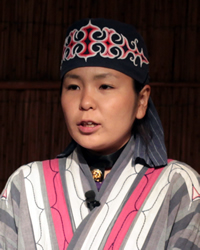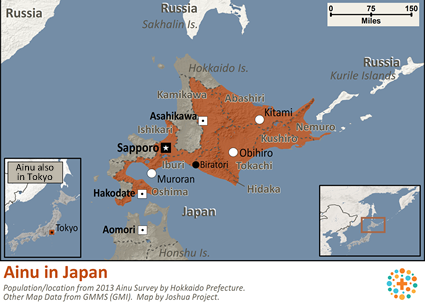The Ainu people lived in the northern regions of Japan and in parts of Russia. Most say that the closest Ainu relatives are from Tibet or the Andaman Islands off of India, although testing has shown that they could have descended from several other groups as well. The Ainu speak their own language, Ainu. It is known as a language isolate, having no known relationship with any other languages. It is a language unique to the Ainu culture and people.
The Ainu's first contact with the Japanese was around the 13th century. Between the 1600s and 1800s the Ainu traded with the Japanese. They increasingly became dependent upon the Japanese and this led to several Ainu revolts. The Japanese also brought new diseases into the Ainu community.
During the Meiji Restoration the area where the Ainu lived (Hokkaido) was annexed by the Japanese. Land was taken from the Ainu. The Ainu were labeled "former Aborigines." The result was the loss of their autonomy and indigenous standing. The assimilation into Japanese culture had begun. The Ainu people were not officially recognized or restated until June 6, 2008.
The Ainu were originally fishermen and hunters. The Ainu lived off of bear, fox, wolf, fish, vegetables, herbs, and roots. The men ate with chopsticks and the women ate with wooden spoons. Their homes were huts located beside water. Each Ainu "village" consisted of 4-10 families. The average age of marriage was 17-18 for men and 15-16 for women. When children were born they were not given names until around 2-3 years old.
The Ainu have a creation story that is similar to what we read in Genesis. They believe that in the beginning there was a great slushy quagmire of mud all over the earth. There was no life and it was cold and desolate. Then the creator sent a water-wagtail (a songbird) to earth. The bird saw what a mess it was, so he fluttered over the water, trampled upon the muddy earth, beat the dirt down with his tail, and eventually separated the waters from the land. The waters became oceans, and the land was gradually raised to float over the waters. Thus the Ainu call the world "floating earth."
Today the Ainu are citizens of Japan. Like other ethnic minorities, they are never completely accepted in this uni-cultural nation. Their ancient culture is dying.
The word Ainu means, "Nature." The word "Kamuy" is used for everyday things and also things beyond their control. These gods include animals, household objects, and nature. The hierarchy of the religion consisted of grandmother earth (fire), mountain animals, sea animals, and finally everything else. The bear held a special place in the Ainu religion. Ainu sacrificed animals. Also, tattooing was a part of their custom. Many woman from a young age had tattoos around their mouths. During the Meiji Restoration, they were forced to leave behind animal sacrifices and the art of tattooing.
The Ainu are often marginalized in Japanese society. Their language is also disappearing and it is on the endangered language list. Their greatest need today, besides a Savior, is the preservation of their culture.
Pray that the Ainu language would be preserved and that those who still speak the language would have the opportunity to hear and respond to the gospel.
Pray that those who still practice the Ainu religion would come to know and worship the one, true God.
Pray that God would raise up Ainu leaders who would help preserve the traditions and at the same time introduce Christ.
Pray for a movement to Christ among the Ainu people.
Scripture Prayers for the Ainu (Japan) in Japan.
http://en.wikipedia.org/wiki/Ainu_people
http://goo.gl/3jQg8
http://goo.gl/PFlTZ
| Profile Source: Rachel Routt |


























